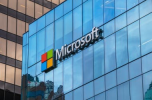- Date
- 14 December 2022
Microsoft acquires small stake in London Stock Exchange
Microsoft acquires small stake in London Stock Exchange
By Jake Rickman Image credit - Volodymyr Kyrylyuk / Shutterstock.com |
What do you need to know this week?
Microsoft has acquired a £1.5bn stake in the London Stock Exchange’s parent company, the London Stock Exchange Group (LSEG). As reported by the Financial Times, the stake, equivalent to 4% of LSEG’s entire share capital, was acquired from a consortium of investors including Blackstone, Thomson Reuters, CPPIB, and GIC.
The FT described the deal as “the latest incursion by Big Tech into the operation of global markets”. One of Microsoft’s executive vice presidents, Scott Guthrie, will snag a seat on LSEG’s board.
From LSEG’s perspective, Microsoft’s status as a sizeable shareholder will enhance the LSE’s foray into financial data and market analytics, which was announced in 2019 in an effort to compete with the likes of Bloomberg when it acquired data company Refinitiv for $27bn.
Per the FT, “Microsoft will provide LSEG with data analytics and cloud infrastructure products using its Azure, AI, and Teams platforms.” The article goes on to note that Microsoft will leverage its Teams messaging platform to create a “unified” data platform that combines “financial data, analytics, and collaboration tools”.
Why is this important for your interviews?
It’s not as attention-grabbing as an outright buyout, but this deal is interesting if you are interested in equities and public markets law.
As you may know, the regulations and customs that dictate publicly-traded companies are vastly different from the ones that govern private companies. There is also something potentially poetic about the fact that the London Stock Exchange — which sets many of the rules for public listings in the UK — is itself publicly traded.
Though £1.5bn is hardly chump change, it grants Microsoft less than 5% stake in the company. This means that its ability to directly influence the management of LSEG and the LSE itself is limited. However, as any publicly traded company that has had to contend with activist investors can attest, a consolidated if minority concentration of shares in a company allows shareholders to pressure the board.
While Microsoft is hardly an activist investor in the manner of, say, Trian Fund Management, no doubt it expects to receive a return on its significant investment. No doubt it will be interesting to see how the relationship between LSEG and Microsoft pans out of the coming months.
How is this topic relevant to law firms?
As reported by The Lawyer, DLA Piper is advising Microsoft on its minority acquisition in LSEG.
Freshfields, which has served as the LSEG’s long-time adviser, is assisting the company on its obligations under the deal.

